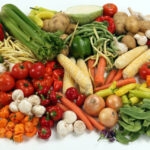Busting Food Myths with Nicole Senior
Myth: Dairy-free diets are better for you
![[NICOLE]](https://glycemicindex.com/blog/2007/dec2007/nicole125.jpg)
Nicole Senior
Fact: Dairy foods are nutrient rich and low fat versions even better
Dairy foods (milk, yogurt, cheese) are nutrient rich and have assumed such importance in our diet as to warrant their own food group. This means that health experts and governments around the world have reviewed the evidence and concluded our health and wellbeing are enhanced by including dairy foods in our diets, and recommended us to eat them.
Along with their low GI status, there is a lot to recommend dairy foods. They are high in calcium needed for healthy bones and provide the majority of calcium in the diet. They also contain a bundle of other important nutrients including protein, vitamins A and B12, riboflavin, phosphorus, potassium, magnesium and zinc. Regular milk drinkers have a lower risk of heart disease and stroke, and emerging research is discovering beneficial ‘bio-actives’ in dairy such as lactoferrin which enhances bone and immune health.
With so much to recommend them, why are there so many “dairy-free” claims on food these days? Why do naturopaths seem to routinely suggest people avoid dairy foods? Why are there websites devoted to the “dangers of dairy”?
Even though whole dairy foods do contain mostly saturated fat, this is easy to avoid by choosing low fat versions, and limiting hard cheese. Although some still believe milk is fattening, studies have demonstrated dairy foods may actually help with weight loss. The Asthma Foundation in Australia says that sufferers should not eliminate dairy without proper medical advice because food affects less than 5% of people with asthma. The idea that milk causes mucus has been studied in controlled conditions and has not stood up to scientific scrutiny.
Milk allergy affects 5% of children at most (and more likely 2%), and 1% of adults. Lactose intolerance is an issue for some people however complete dairy avoidance is not usually necessary. The anti-dairy argument is hard to reconcile with the idea that millions of humans have been eating dairy foods for several thousand years, and even today, the Masai in Tanzania live principally on milk, blood and meat.
Why do anti-dairy myths persist? Food myths are prevalent in societies where food is abundant and choices are practically endless. Are we fussy with our diets because we’re too well fed? Are we desperately clutching at ideas to narrow down our food options because they are now overwhelming? Are we looking to fix our broader dis-ease with hectic modern lifestyles? For those who have chosen the dairy-free path, I’m sorry to say there are a plethora of websites also attacking the safety and goodness of soy milk as well …
If you’d like quality information on heart health and great recipes check out Nicole’s website HERE.







